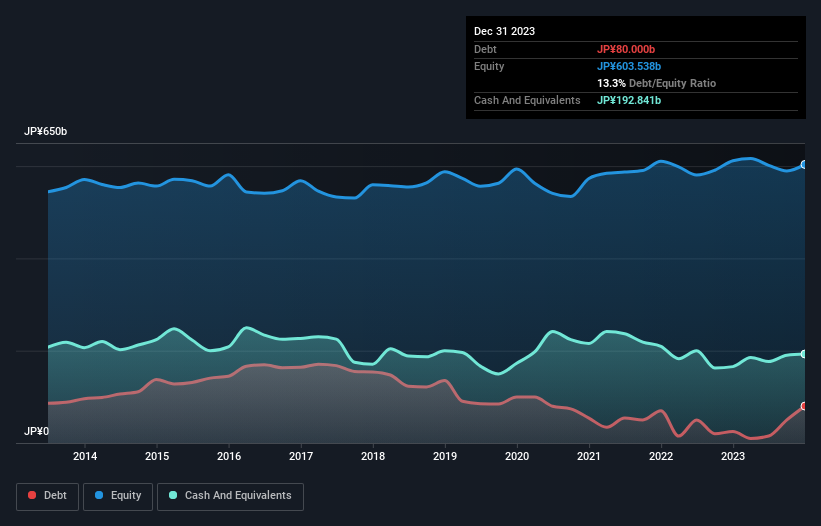These 4 Measures Indicate That Yamato Holdings (TSE:9064) Is Using Debt Reasonably Well

The external fund manager backed by Berkshire Hathaway's Charlie Munger, Li Lu, makes no bones about it when he says 'The biggest investment risk is not the volatility of prices, but whether you will suffer a permanent loss of capital.' When we think about how risky a company is, we always like to look at its use of debt, since debt overload can lead to ruin. As with many other companies Yamato Holdings Co., Ltd. (TSE:9064) makes use of debt. But the real question is whether this debt is making the company risky.
Why Does Debt Bring Risk?
Generally speaking, debt only becomes a real problem when a company can't easily pay it off, either by raising capital or with its own cash flow. In the worst case scenario, a company can go bankrupt if it cannot pay its creditors. However, a more common (but still painful) scenario is that it has to raise new equity capital at a low price, thus permanently diluting shareholders. By replacing dilution, though, debt can be an extremely good tool for businesses that need capital to invest in growth at high rates of return. When we think about a company's use of debt, we first look at cash and debt together.
Check out our latest analysis for Yamato Holdings
What Is Yamato Holdings's Debt?
You can click the graphic below for the historical numbers, but it shows that as of December 2023 Yamato Holdings had JP¥80.0b of debt, an increase on JP¥25.0b, over one year. But on the other hand it also has JP¥192.8b in cash, leading to a JP¥112.8b net cash position.

A Look At Yamato Holdings' Liabilities
Zooming in on the latest balance sheet data, we can see that Yamato Holdings had liabilities of JP¥412.8b due within 12 months and liabilities of JP¥193.1b due beyond that. Offsetting these obligations, it had cash of JP¥192.8b as well as receivables valued at JP¥340.8b due within 12 months. So it has liabilities totalling JP¥72.3b more than its cash and near-term receivables, combined.
Given Yamato Holdings has a market capitalization of JP¥715.7b, it's hard to believe these liabilities pose much threat. But there are sufficient liabilities that we would certainly recommend shareholders continue to monitor the balance sheet, going forward. While it does have liabilities worth noting, Yamato Holdings also has more cash than debt, so we're pretty confident it can manage its debt safely.
It is just as well that Yamato Holdings's load is not too heavy, because its EBIT was down 32% over the last year. When it comes to paying off debt, falling earnings are no more useful than sugary sodas are for your health. When analysing debt levels, the balance sheet is the obvious place to start. But ultimately the future profitability of the business will decide if Yamato Holdings can strengthen its balance sheet over time. So if you want to see what the professionals think, you might find this free report on analyst profit forecasts to be interesting.
Finally, while the tax-man may adore accounting profits, lenders only accept cold hard cash. Yamato Holdings may have net cash on the balance sheet, but it is still interesting to look at how well the business converts its earnings before interest and tax (EBIT) to free cash flow, because that will influence both its need for, and its capacity to manage debt. During the last three years, Yamato Holdings produced sturdy free cash flow equating to 72% of its EBIT, about what we'd expect. This free cash flow puts the company in a good position to pay down debt, when appropriate.
Summing Up
While Yamato Holdings does have more liabilities than liquid assets, it also has net cash of JP¥112.8b. And it impressed us with free cash flow of JP¥57b, being 72% of its EBIT. So we don't have any problem with Yamato Holdings's use of debt. The balance sheet is clearly the area to focus on when you are analysing debt. However, not all investment risk resides within the balance sheet - far from it. We've identified 1 warning sign with Yamato Holdings , and understanding them should be part of your investment process.
At the end of the day, it's often better to focus on companies that are free from net debt. You can access our special list of such companies (all with a track record of profit growth). It's free.
New: Manage All Your Stock Portfolios in One Place
We've created the ultimate portfolio companion for stock investors, and it's free.
• Connect an unlimited number of Portfolios and see your total in one currency
• Be alerted to new Warning Signs or Risks via email or mobile
• Track the Fair Value of your stocks
Have feedback on this article? Concerned about the content? Get in touch with us directly. Alternatively, email editorial-team (at) simplywallst.com.
This article by Simply Wall St is general in nature. We provide commentary based on historical data and analyst forecasts only using an unbiased methodology and our articles are not intended to be financial advice. It does not constitute a recommendation to buy or sell any stock, and does not take account of your objectives, or your financial situation. We aim to bring you long-term focused analysis driven by fundamental data. Note that our analysis may not factor in the latest price-sensitive company announcements or qualitative material. Simply Wall St has no position in any stocks mentioned.
About TSE:9064
Yamato Holdings
Provides logistics shipping services in Japan and internationally.
Excellent balance sheet average dividend payer.
Market Insights
Community Narratives




